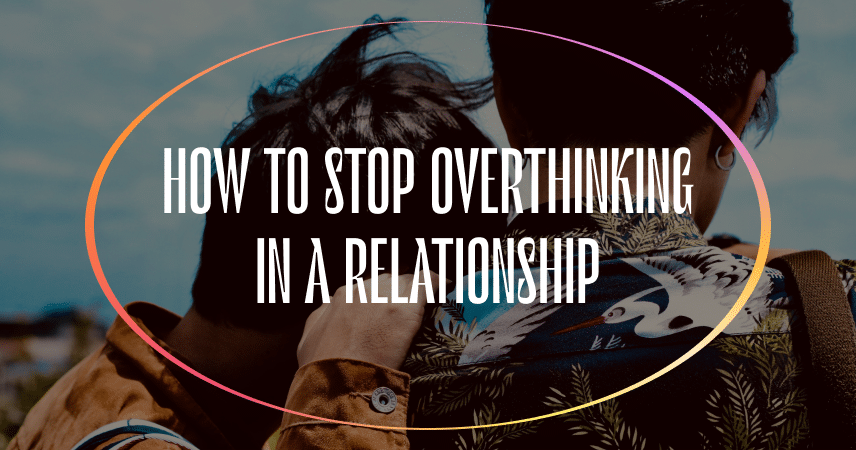Stop Overthinking In Your Relationship – Here’s How

This has happened many times. It’s been a long stressful day, and you are ready to settle in for a decent night’s sleep. But that sleep doesn’t come. There’s underlying anxiety about events of the day. Maybe you had an argument with family members or a co-worker; you’ve been working on a project, and it isn’t coming together; you had a meeting with your boss that didn’t go well. Now your brain wants to relive all of these things. In short, you are over-thinking all of the situations, and sleep is impossible. Sometimes, it’s called ruminating. The same thing can happen in romantic relationships, only the ruminating can occur both day and night.
It’s important to learn how to stop overthinking in a relationship because it can be pretty destructive in the long run. And if you’re prone to overthinking in general, this will be a challenge. Let’s look at why you overthink and how to stop it.
What Overthinking Looks Like
If you don’t know that you are overthinking, then you will never be able to fix it. So here are the symptoms:
- You try to analyze every word that is said and every action your partner takes
- You think about how your partner said something – tone of voice, for example
- You watch your partner’s body language and try to figure out what it means
- You re-read your partner’s everyday texts over and over, trying to find hidden meanings.
- When your partner leaves to go somewhere, you question whether they are telling you the truth
- You freak out when your partner makes a small comment that might be critical
- You keep trying to figure out how you feel, and you try to “mind read” what your partner is feeling.
- You are afraid to send text messages because you might say the “wrong thing.”
- You think your partner is mad at you and they are not
- You say you are sorry when there is no need to be
- You watch all of your partner’s interactions with potential “competition” and find yourself feeling jealous, even though you have no idea what they are talking about
If you look at this list, you should be able to see that most of these behaviors on your part are the result of insecurity. And that insecurity is just one of the factors in why you are overthinking in your current relationship.
Why You Overthink
There are three major reasons why you overthink in your current romantic relationship, and you will have to deal with them if you are to overcome this battle.
Low Self-Esteem
There are many causes for a person’s low sense of self-worth. It can go all the way back to your childhood and how you were treated growing up. Over a period of time, you grew to think of yourself as less worthy of the best things in life. And that means worth in a relationship too. And so, when that relationship comes along, you cannot accept that it is real. So, you over-analyze each word and behavior of your partner, to look for reasons to feel insecure. When you live in a relationship with this background, it will never be a healthy one. In fact, you might want to see a licensed clinical psychologist, or at least a family therapist, to explore your earlier life and develop methods and strategies to achieve the sense of self you rightly deserve.
A Disastrous Past Relationship
Maybe you’ve even had more than one of these. When a relationship goes bad and someone is really hurting, it’s hard to get back out into the dating scene, much less into a relationship. And when they do, the memories of being treated badly can carry over to this new person. And so, the overthinking begins. It’s a bad cycle to be in.
In this situation, it is usually a good idea to take a deep breath and postpone getting involved for a while. Better to take some time for self-care and work on other things in their own life first. Again, a licensed clinical psychologist can help. When a relationship ends badly, it can be sort of like a death, and there is a grieving process to get through.
Abandonment Issues
These can go back to childhood, especially if one or both parents have “abandoned” them. Now abandonment can mean many things – one parent leaving due to a divorce, both parents being so involved in personal fulfillment with careers and such that they have no time to nurture a child, etc. In these situations, a kid can grow up thinking they were not good enough to get their parents’ love and are not then good enough to get anyone’s love. So, when they do get into a relationship, the overthinking begins – they are sure that every argument, every mistake, etc. will cause that partner to leave. It’s a horrible way to live, and often a family therapist should be involved, in order to deal with those childhood issues.
These three causes for overthinking are often known as cognitive distortions in the field of psychology. And breaking those patterns will take some work if an overthinker wants to end up with a healthy relationship. A family therapist may be the right move to make.
So, how do you go about changing those thoughts and behaviors? According to many relationship experts, here are things you need to work on.
How to Stop Overthinking in a Relationship – Six Things to Do Now
All of these may not apply to you but study them carefully. If any of them do, then heed the relationship advice given.
Identify the Triggers
You may need to keep some kind of a diary to do this. When you go into the overthinking mode, stop and write down exactly what happened to cause this. Was it an argument, something your partner said to you, or maybe a spot of jealousy when you were out around others and that partner spent a little too much time with someone else? Was it a text message that caused you to wonder if your partner cares at all? You will start to see patterns of when your overthinking happens. As you identify these, then you can find ways to avoid them.
For example, if you find yourself in a “jealous moment” when you two are out, instead of just being in a bad mood about it, get some backbone, walk over to them, and join in the conversation. You may find that they are talking about their jobs or something else just as innocuous. Gradually, over time, those scary thoughts will subside, and your comfort level will increase.
Work on Communication
We all say things in the present moment. They may be unclear, hurtful, or flippant. And we don’t realize how they may be taken by the person we talk to. Give your partner the right to do this too. Unclear communication can cause you to “read” a lot into those words that are not really there. Instead of ruminating on those words, you must practice some assertiveness here.
Ask your partner exactly what they meant by the comment or the text. In some cases, they will not even be able to tell you – the words just came out at the moment without much thought. And sometimes, they are insensitive. Again, you need to focus on how that message or talk made you feel and express that to your partner. If they were hurtful, say so. If that partner really cares, they will try to choose their words more carefully. And when they don’t, call them on it. You have rights in this relationship too.
Effective Communication must go both ways. If you are simply listening and not responding, then you aren’t really communicating.
Request Advice, But Not Too Much
You may have a really close friend or two. And they have given good advice in the past. You can ask them about what they observe when they see the two of you together or you relate some of the things that are bothering you. If they have been really honest in the past, chances are they will be now too.
But don’t seek out too many opinions. Sometimes, others just want to reinforce what you are feeling to “be on your side.” This is not helpful. You want advice that will focus on objectivity.
Getting professional advice from a relationship coach may be in order. Here is someone who can be totally objective about what you are thinking and feeling; they will ask the right questions and provide advice that is grounded in experience and expertise.
Invest in Yourself and Your Productivity
The less time you have to overthink, the better. Your personal life is important and should include far more than focusing on your insecurities in partnership. After all, that makes you a really boring person and can drive that partner away.
It’s time to put some emphasis on yourself. You may have a job, but what else are you doing with your time? Take a class, go out with other friends, volunteer, or take a weekend getaway on your own or with a couple of close friends. If you stay busy, you have less time to overthink.
As you do these things, your sense of self-worth will rise, and your confidence level increases. And guess what? Your squeeze just may see you in a whole different light and as someone he really wants to be around more. Both of you may actually develop different love languages – far more positive and endearing ones.
The goal is to get your mind off of your relationship and onto healthier things. If this makes you feel uneasy because you are worried about what your partner may be doing, then you are really in too deep. A relationship or dating coach is in order.
Accept That This May Not Last
Relationships do come and go all the time. Each one is vulnerable to things beyond the control of either or both partners.
- One takes a new job in a different city, and the long-distance thing just doesn’t work
- One finds someone else and just wants out
- You may have hooked up with a narcissist. If you stay, your mental health will suffer. Learn the behaviors of a narcissist to see if this is your situation, and just get out. The fault is not yours, and it has nothing to do with your worth.
- Partners may alter their life goals, and they just aren’t compatible anymore. People tend to grow apart, and it is no one’s fault.
The important thing here is that you stay grounded in your own worth. This means understanding that you don’t take things personally when there is a breakup. And if you develop a “life” outside of this partnership, staying grounded is much easier.
Do Not Engage in Mind Reading
You get a text, overhear a phone conversation, or are on the receiving end of some comment that bothers you. You then spend the next several hours trying to figure out some hidden meaning. Once you start overthinking, you expand it to your entire relationship and begin to ruminate on all sorts of other things said and done. You have to stop obsessing like this.
Vikki Ziegler, matrimonial lawyer, author, relationship expert, and TV personality, puts it this way: “Sometimes people don’t communicate properly and don’t always say things that they mean…just because your partner doesn’t say I love you several times a day or is not comfortable with PDA, it doesn’t mean you don’t have an amazing relationship. Stop obsessing over certain words or lack thereof, and if you feel a certain way, ask your partner — don’t obsess over it.”
When you find yourself doing the mind-reading thing, identify it immediately, and take your brain somewhere else with some positive self-talk. If you have been meeting with a family therapist or a relationship expert, you will certainly have developed some ways to do this. Did you meet a challenge at work? Did you have a fun happy hour with some co-workers? Did someone compliment you today? Did you get some new clothes or a great haircut? Thinking about these small positive things can be one of the best strategies to get your mind on the right track.
The Best Advice?
People overthink for the reasons mentioned above. Overall, though, this behavior comes from a focus on what might be wrong rather than a focus on what is right, and a general feeling of insecurity and lack of worth. You deserve happiness; you deserve to focus on your worth. But if you continue down a path of overthinking every little thing in your relationship in a negative way, that relationship will never last. Your partner will grow weary, and you will be mentally exhausted. Do both of you a favor. Take the advice from these six methods to stop overthinking, get professional help if you need to, and build a life for yourself both inside and outside of that relationship.


